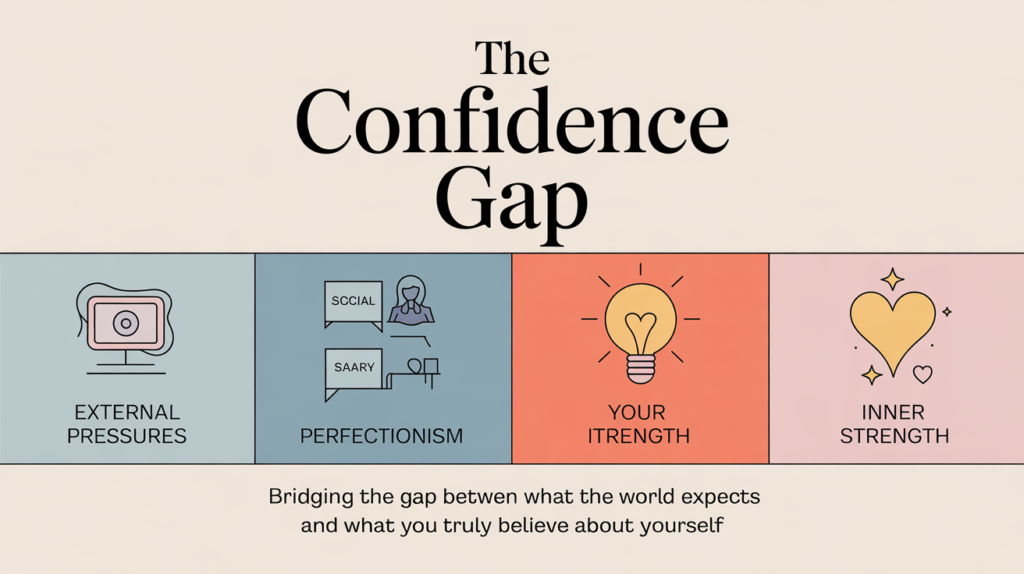Have you ever tucked a creative project you’re proud of into a drawer because you were too hesitant to share it? Or scrolled through social media feeling like everyone else has it all figured out? You are not alone. Learning how to build confidence isn’t about becoming a different person; it’s about unlocking the assured, capable woman already within you.
This guide is designed to provide actionable, research-backed, and experience-tested strategies specifically for women. The advice here is curated from confidence research, psychological principles, and insights from women who have walked this path. We’ll explore practical ways to build your confidence and self-esteem, giving you the tools to find your inner strength and thrive in your hobbies, career, and life.
Understanding the Confidence Gap: Why It’s Not Just You

If you have ever felt like your male colleagues seem to have an unshakeable belief in their own abilities, you’re not imagining things. Research points to a phenomenon known as the confidence gap, where women often underestimate their skills while men tend to overestimate theirs. This isn’t a personal failing; it’s a pattern shaped by societal expectations and ingrained biases.
The real-world impact of this gap is significant. It can lead women to set their salary expectations about 17% lower than men for the same jobs. It also fuels the perfectionism trap, where women may avoid applying for a role unless they meet 100% of the listed qualifications, holding themselves back from opportunities they are perfectly capable of excelling in. Understanding the psychology of how to build confidence starts with recognizing these external pressures.
The Inner Foundation: Cultivating a Confident Mindset
True, lasting confidence begins from within. It’s about changing the way you think and speak to yourself. The following strategies are foundational to building a resilient and positive inner world.
| Strategy | Core Idea | A Small Step to Start |
| Challenge Your Inner Critic | Your thoughts aren’t always facts. Learn to identify and reframe negative self-talk. | When a thought like I am not good enough pops up, ask: Is this 100% true? What’s the evidence against it? |
| Embrace Self-Compassion | Treat yourself with the same kindness you would offer a friend. It’s a key component of resilience. | After a setback, say to yourself: It’s okay that this was hard. I’m learning, and I can try again. |
| Practice Positive Affirmations | Use affirmations to retrain your subconscious. They should be in the present tense, positive, and personal. | Start your day by looking in the mirror and saying, I am capable, I am worthy, and I am enough. |
| Keep a Wins File | Track your achievements, big and small. This creates tangible evidence of your capabilities. | Each Friday, write down three things you did well that week, from finishing a big project to simply setting a boundary. |
Learning how to build self-confidence is a practice, and these small steps can create a powerful shift over time. When I started Femme Hobbies, I doubted whether anyone would read my articles. But with each post I published, my confidence grew, not because it was perfect, but because I kept showing up.
That touch of real-life storytelling makes it feel even more authentic.
The Outer Expression: Actions That Build Confidence
Once you start strengthening your inner foundation, the next step is to translate that mindset into action. Confidence is built not just by thinking differently, but by doing differently.
If the concept of self-compassion resonates with you, I highly recommend Brené Brown’s The Gifts of Imperfection. As a researcher who has spent decades studying vulnerability and courage, Brown provides a powerful framework for letting go of perfectionism and embracing authentic confidence. It’s been a game-changer for many women in our community.
Step Out of Your Comfort Zone
Growth rarely happens when we feel completely comfortable. To build confidence, you need to gently push your own boundaries. Set stretch goals, ambitious but achievable targets that require you to learn and adapt. Most importantly, learn to see failure as feedback, not a final verdict. Each misstep is simply data you can use to improve your approach for next time.
Communicate with Authority
How you communicate can dramatically impact how confident you feel and how others perceive you. Practice speaking clearly and at a steady pace. Maintain eye contact when you’re talking to someone to show you are engaged and believe in what you’re saying. Own your opinions without adding apologetic phrases like This might be a silly question, but… Your voice deserves to be heard. Learning how to build confidence in speaking is a powerful tool for self-advocacy.
Dress and Act the Part
Your appearance can directly influence your mindset. Wear clothes that make you feel powerful, competent, and authentic to your personal style. Before an important meeting or presentation, try practicing power poses, standing tall with your hands on your hips or stretching your arms out wide. Research shows these small physical shifts can help you gain confidence quickly by boosting feelings of power and reducing stress.
Confidence in Key Areas of Life
Building confidence is not a one-size-fits-all process. The strategies you use can be tailored to different areas of your life, from your career to your personal passions.
How to Build Confidence at Work
A staggering 79% of women report a lack of confidence at work. To combat this, focus on tangible actions. When you receive positive feedback, don’t brush it off—truly absorb it. Actively seek out constructive criticism to show you’re committed to growth. Most importantly, focus on mastering a specific skill. Becoming the go-to expert in one area is a surefire way to boost your professional self-esteem.
Building Confidence Through Hobbies
Hobbies offer a unique and powerful way to build confidence. Engaging in activities like painting, mixing cocktails, or learning to belly dance creates a safe space to take risks and learn without high-stakes pressure. As you master a new skill, you gain tangible proof of your ability to learn and grow. This sense of competence, the feeling of I did that!- spills over into other areas of your life, directly fueling your self-esteem.
Here are 10 things to boost your self-esteem through hobbies:
- Learn a new language.
- Take a pottery class.
- Join a local hiking group.
- Start a blog about a topic you love.
- Master three classic cocktail recipes.
- Learn to play an instrument.
- Take up photography.
- Try a dance class.
- Volunteer for a cause you care about.
- Learn basic coding.
Beyond Yourself: Building a Supportive World
Confidence isn’t built in a vacuum. The environment and the people you surround yourself with play a crucial role in supporting your growth.
Surround Yourself with Positive People
Pay attention to how you feel after spending time with different people. Do they leave you feeling drained and doubtful, or energized and inspired? Actively cultivate an inner circle of supportive friends, mentors, and peers who celebrate your wins and encourage you through challenges. Your social circle should be a source of strength, not stress.
Lift Others Up
Truly confident people are not threatened by the success of others; they’re inspired by it. One of the most effective ways to solidify your own confidence is to help build it in someone else. Mentor a junior colleague, offer a kind word to a friend who is struggling, or celebrate the achievements of others. This creates a positive ripple effect that reinforces your own sense of capability and abundance.
Building a More Confident You
Learning how to build confidence is a journey of self-discovery, not a destination. It’s about taking small, consistent steps to align your inner mindset with your outward actions. By challenging your inner critic, stepping out of your comfort zone, and curating a supportive environment, you can unlock the powerful, capable woman you already are. Start with one small step today, and watch as your inner strength grows.
Confidence grows one choice at a time. Which of these steps will you take today? Share your journey in the comments or explore more confidence-boosting hobbies on FemmeHobbies.com.
Frequently Asked Questions (FAQ)
For highly sensitive people, confidence comes from honoring your nature, not fighting it. Acknowledge that you process things deeply, and use that as a strength. Set firm boundaries to protect your energy, create quiet time to recharge, and focus on environments where your empathy and perceptiveness are assets. Confidence for you is about creating a life that aligns with your sensitivity.
For those looking for a good how to build confidence book, some highly recommended titles include The Confidence Code by Katty Kay and Claire Shipman, which specifically addresses the confidence gap. Brené Brown’s The Gifts of Imperfection is excellent for cultivating self-compassion, and You Are a Badass by Jen Sincero offers a motivational and humorous approach.
Building confidence in kids involves encouraging them to try new things and praising their effort, not just the outcome. Allow them to make small, safe mistakes and solve their own problems. Model confident behavior yourself, and create a home environment where it’s safe to express feelings and take on challenges without fear of judgment.

